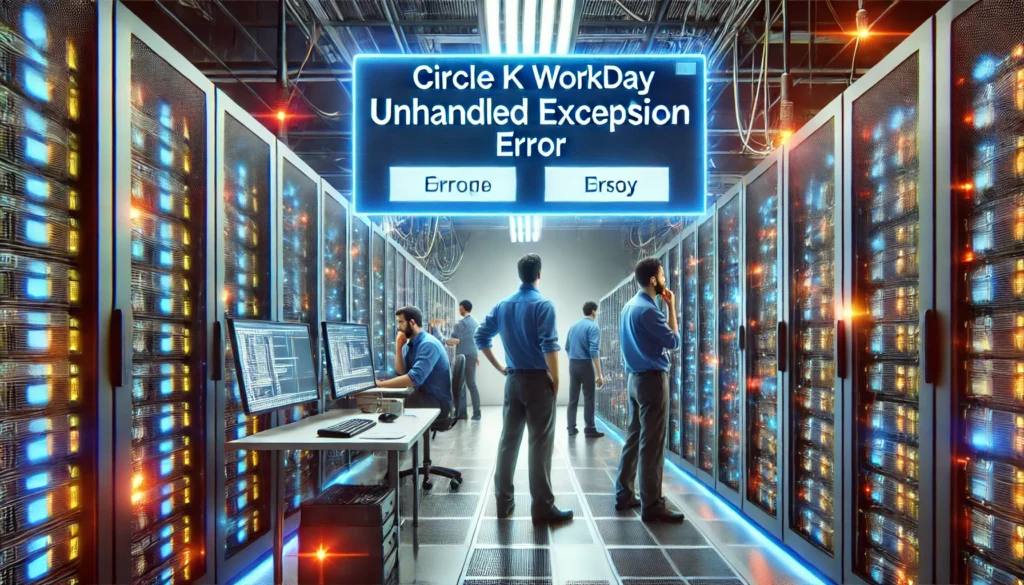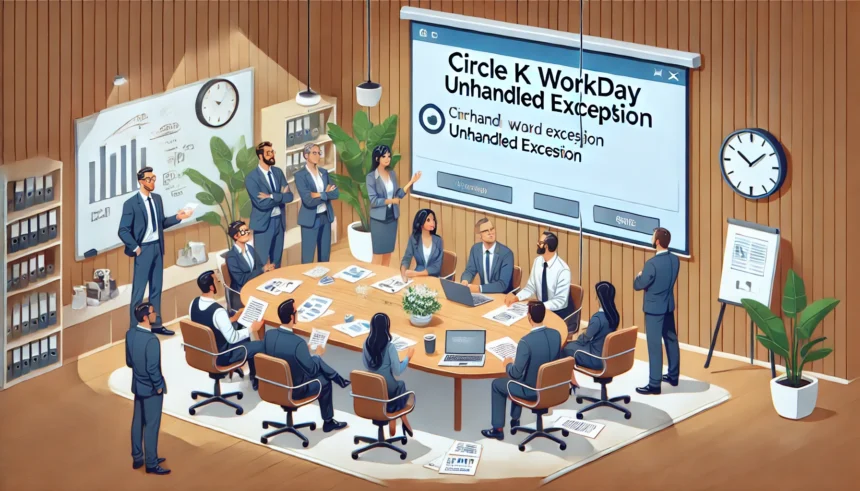Circle K is a well-known global convenience store chain that uses Workday to manage its workforce, payroll, finance, and other essential business operations. Workday, a cloud-based enterprise management platform, is designed to streamline processes and improve efficiency. However, like any complex system, Workday can sometimes encounter issues that disrupt its normal functioning. One of the most problematic issues that businesses like Circle K might face is a Circle K Workday Unhandled Exception.
In this article, we will delve into what unhandled exceptions are, the common causes behind them, their potential impacts on business operations, and the steps Circle K can take to resolve these issues and prevent them in the future.
What is an Unhandled Exception?
An Unhandled Exception refers to an error or problem that arises in a software system that the system itself does not know how to manage. In the case of Workday, when an exception occurs, the system is unable to process the error and continue functioning as expected. This can cause Workday to crash, freeze, or stop working, which can severely disrupt operations.
For Circle K, this is particularly concerning because Workday manages critical functions such as payroll, HR data, and employee records. When an unhandled exception occurs, it may halt or delay important processes, leading to frustration for employees and managers alike.
Causes of Workday Unhandled Exception at Circle K
There are several common causes behind unhandled exceptions in Workday. Identifying these causes is the first step in resolving the issue and ensuring that it does not happen again. Below are the main factors that can trigger unhandled exceptions:
Software Bugs and Coding Errors
Workday, like all software systems, is built using complex code. If there is a flaw in the code (such as a bug), the system might encounter unexpected situations that it cannot handle. These bugs can arise during system updates or from new features being added to the system.
Integration Failures
Workday often integrates with third-party systems, such as payroll software, employee benefits tools, and time-tracking systems. If there is a failure in one of these integrations (e.g., a mismatch in data formats or an error during data transfer), Workday may not be able to process the information properly, resulting in an unhandled exception.
Database Connectivity Problems
Workday relies heavily on databases to store and retrieve information. If there are issues with database connectivity, such as slow response times or errors in retrieving data, it can trigger exceptions. For example, if the system cannot access employee data from the database, it may stop functioning correctly.
Insufficient System Resources
Workday requires adequate system resources to function properly. This includes memory, processing power (CPU), and storage space. If these resources are exhausted or unavailable, Workday may fail to complete tasks, leading to system errors and crashes.
Configuration Errors
Configuration settings within Workday are critical to its performance. Incorrect settings, such as improper permissions for users or misconfigured system preferences, can cause unexpected errors. For example, if an employee’s permissions are incorrectly set, it might prevent them from accessing certain functions, which could result in an exception.
Outdated Software
Workday regularly releases updates to improve functionality and fix bugs. If Circle K’s Workday system is running outdated software versions, it might encounter compatibility issues with newer integrations or features. Running outdated versions of software can make the system more vulnerable to unhandled exceptions.
The Impact of Unhandled Exceptions in Workday
An unhandled exception in Workday can have serious consequences for Circle K’s operations. Here are the primary impacts that such issues can have on the business:
System Downtime
One of the most immediate effects of an unhandled exception is system downtime. When Workday crashes or freezes due to an error, employees are unable to access vital HR information, pay stubs, or schedules. For Circle K, this downtime can cause a ripple effect, delaying payroll, disrupting HR tasks, and preventing managers from making timely decisions.
Data Inconsistencies
Data loss or corruption is another serious consequence. If an exception occurs while data is being processed, it could result in incomplete or inaccurate data being stored in the system. This could affect payroll calculations, employee records, and financial reports. Inaccurate data can lead to mistakes that might impact employee compensation or company financials.
Operational Disruptions
Employees and managers rely on Workday to perform daily tasks, such as tracking working hours, updating personal information, and accessing benefits. When an unhandled exception occurs, it can disrupt these operations, causing delays, confusion, and frustration among users.
Loss of Trust
Frequent or unresolved unhandled exceptions can erode trust in the system. Employees might feel that the software is unreliable or inefficient, leading to lower user satisfaction. For Circle K, this loss of trust can affect employee morale and reduce productivity.
Diagnosing the Cause of Unhandled Exceptions
To resolve an unhandled exception, Circle K’s IT teams must first diagnose the root cause of the problem. Here are the steps that can be taken to identify the cause:
- Error Logs and System Monitoring Workday maintains logs that capture error details whenever an issue occurs. By reviewing these logs, IT administrators can identify the exact nature of the exception and track down its origin.
- Collaboration with IT Teams Diagnosing system issues often requires a collaborative effort. IT support staff, Workday administrators, and external consultants (if necessary) can work together to identify potential problems in the code, system configuration, or integrations.
- System Updates Checking for software updates is crucial. If the system is running outdated software, it may be more prone to errors. Ensuring that the system is updated with the latest patches and versions can prevent many issues.
- User Feedback Employees and managers who use Workday on a daily basis may have noticed patterns in when or how the exception occurs. Their feedback can help IT teams narrow down the cause and work on a solution.
Solutions to Fix Unhandled Exceptions
Once the cause of the unhandled exception is identified, Circle K can take several steps to fix the issue:
- Review and Update Software Ensuring that Workday is running the most recent software updates can help resolve bugs and security vulnerabilities. Updating the software regularly also keeps it compatible with new features and integrations.
- Improve Error Handling and Logging Workday’s error-handling capabilities can be enhanced by implementing more advanced error management protocols. This will allow the system to gracefully handle exceptions and recover without crashing, rather than freezing or terminating unexpectedly.
- Check Integrations If third-party integrations are causing issues, Circle K’s IT team should review the integration settings and test each integration to ensure that data flows smoothly between systems. Misconfigured or broken integrations need to be corrected to avoid triggering exceptions.
- Increase System Resources If system resources like memory, CPU, or storage are insufficient, Circle K should consider upgrading its hardware or optimizing the system’s resource usage to ensure that Workday runs smoothly.
- Revisit Configuration Settings Reviewing and correcting configuration settings can help resolve issues that might be causing exceptions. This includes checking user permissions, system preferences, and other settings that might be misconfigured.
Preventative Measures to Avoid Future Exceptions
To minimize the likelihood of future unhandled exceptions, Circle K can implement the following preventive measures:
Regular System Audits
Conducting regular audits of Workday’s settings, configurations, and integrations ensures that any potential issues are identified early. Proactive maintenance helps avoid unhandled exceptions from affecting business operations.
User Training
Ensuring that employees are properly trained on how to use Workday can reduce errors caused by improper usage. Well-informed users are less likely to trigger exceptions.
Automated Alerts
Implementing automated alerts that notify IT administrators about system anomalies can help identify and resolve issues before they lead to an unhandled exception.
Proactive Integration Testing
Regularly testing third-party integrations is essential to ensure that they continue to work smoothly with Workday. This helps prevent integration-related errors that might cause unhandled exceptions.
Develop a Contingency Plan
Having a contingency plan in place for when unhandled exceptions occur ensures that Circle K can recover quickly. The plan should include steps for system restoration, data recovery, and communication with employees.
Conclusion
Unhandled exceptions in Workday can create significant disruptions for Circle K, affecting everything from payroll to employee records. However, by understanding the causes, identifying the impacts, and implementing solutions, Circle K can effectively manage these issues. Regular system audits, timely updates, improved error-handling procedures, and proper user training are key steps in minimizing Circle K Workday Unhandled Exception and maintaining a smooth, efficient Workday system for all users. By taking these proactive steps, Circle K can ensure that its business operations continue running without interruption, even in the face of technical challenges.
FAQs
What is an unhandled exception in Workday?
An unhandled exception occurs when Workday encounters an error that the system cannot process, causing disruptions or crashes. It requires intervention to resolve the issue.
What are the common causes of unhandled exceptions in Workday?
Common causes include software bugs, integration failures, insufficient system resources, configuration errors, and outdated software versions affecting system performance.
How can unhandled exceptions impact Circle K’s business operations?
Unhandled exceptions can lead to system downtime, data inconsistencies, operational disruptions, and a loss of trust in the Workday platform, affecting overall productivity.
How can Circle K diagnose an unhandled exception in Workday?
Circle K can diagnose the issue by reviewing error logs, collaborating with IT teams, checking for system updates, and gathering feedback from users to identify the cause.
What preventative measures can Circle K take to avoid unhandled exceptions?
Circle K can implement regular system audits, user training, automated alerts, proactive integration testing, and develop contingency plans to prevent future exceptions.
Article Recommendations
SBT Labs Business Evaluation: Transforming Businesses with Advanced Analytics
5starsstocks .com: Combining Insights, Education, and Simplicity
Strategic Roadmap Vision Biotechnology Company: Aligning Goals and Innovation”
Anthony Skaria Partners: Revolutionizing Real Estate Investment and Business Advisory











